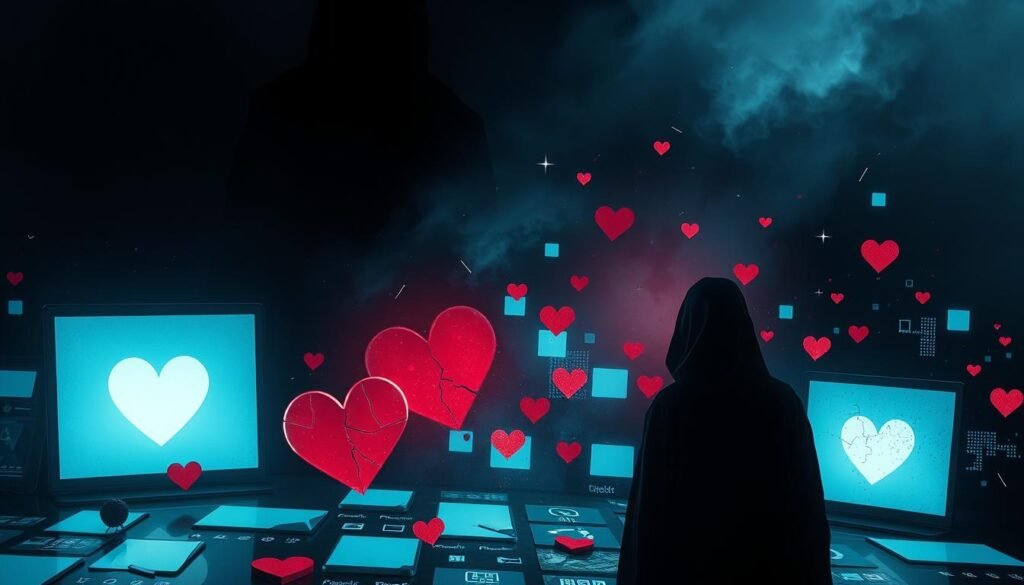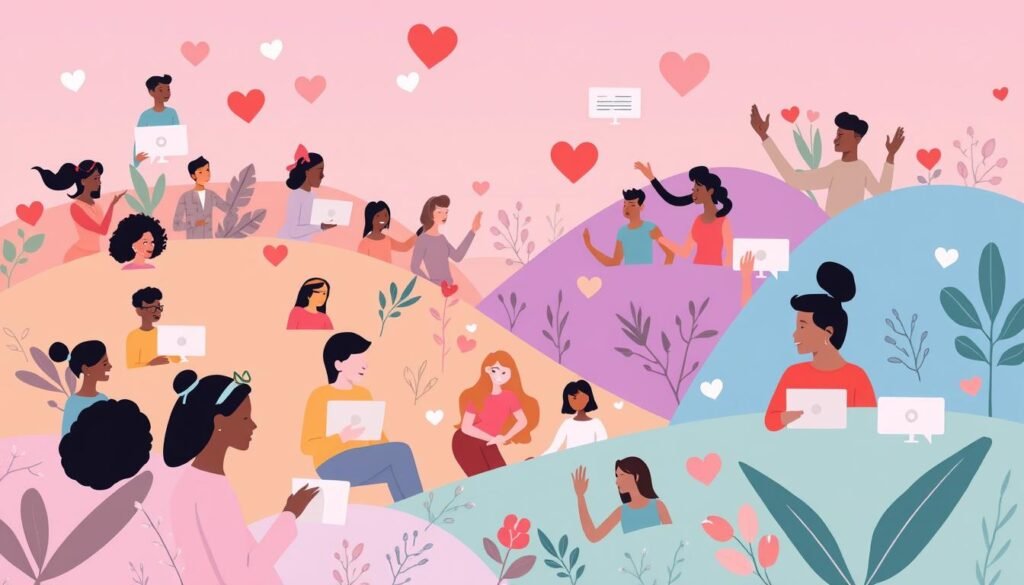Spending a lot of time on social media can lead to developing depression, especially for those in the highest usage quartile. A study involving nearly 1,800 young adults in the U.S. discovered this troubling link.
Facebook depression is a term for the sadness and anxiety caused by social media. It’s important to recognize its signs since they heavily impact mental health and personal relationships. In this piece, we’ll delve into the signs and impacts of Facebook depression. Plus, we’ll offer helpful tips for recovering and boosting one’s digital health.
Key Takeaways
- Facebook depression is linked to increased social media usage.
- Signs include persistent sadness, anxiety, and feelings of hopelessness.
- Negative impacts on mental health can include isolation and low self-esteem.
- Engaging in recovery strategies can help enhance overall mental well-being.
- Participating in online support groups can provide meaningful connections.
Understanding Depression and Its Types
Depression comes in several forms, affecting millions. In the U.S., about 16.2 million adults suffer from it. That’s around 6.7% of adults. Every depression type has its own symptoms and challenges. Major depression involves constant sadness. It disrupts life for at least two weeks. Then, there’s persistent depressive disorder, lasting two years, making it more chronic.
Perinatal depression affects roughly 1 in 9 women during or after pregnancy. It brings both emotional and physical challenges in a key time. Seasonal affective disorder hits about 5% of adults, mainly in late fall or winter.
Bipolar disorder intertwines with depression, impacting 2.8% of adults. Treatment varies. About 45-60% benefit from psychotherapy alone. Some may need medication, taking 4-8 weeks for relief. It’s crucial to understand these types to properly treat depression symptoms.
| Type of Depression | Prevalence | Duration | Treatment Options |
|---|---|---|---|
| Major Depression | 10.3 million adults annually | At least 2 weeks | Psychotherapy, Antidepressants |
| Persistent Depressive Disorder | 4.1% of adults in a given year | 2 years | Psychotherapy, Medication |
| Perinatal Depression | 1 in 9 women | During pregnancy/Postpartum | Therapy, Medications |
| Seasonal Affective Disorder | 5% of adults | Seasonal onset | Light therapy, Medication |
| Bipolar Disorder | 2.8% of adults | Varies | Mood stabilizers, Psychotherapy |
What is Facebook Depression?
Facebook depression is when spending too much time on social media hurts your mood. It happens when people see the perfect lives others seem to have online. This makes them feel down or not good enough. Facebook, with its 1.79 billion users, is a big place for this. It can lead to addiction and hurt your mental health.
Studies have found a link between social media and feeling depressed. About 16% of studies saw a connection. People get caught up in how they look online and may feel jealous. This can make them overthink and feel lonely or sad.
Women and people with certain personality types might feel worse from social media. Facebook can make you feel more depressed and hurt your relationships. Spending too much time online can pull you away from real friends and family.
Although a few studies say social networks can be good for your mood, most don’t. They say that comparing yourself to others on Facebook often leads to feeling worse. It spells trouble for how we handle our feelings.
Signs of Facebook Depression
Social media platforms can significantly impact mental health. It is crucial to recognize signs of Facebook depression. This will help address issues and promote emotional well-being. Individuals often show mental health symptoms. These may include persistent sadness and anxiety, leading to hopelessness. Knowing these signs is the first step to seeking help.
Persistent Sadness and Anxiety
Some people may feel persistently sad, spiraling into anxiety. This sadness can make previously joyful activities seem dull. Megan Moreno’s study revealed almost 25% of Facebook profiles showed depression signs. This highlights a worrying trend. Frequent social media use can intensify sadness. It can lead to unhealthy comparisons and worsen mental health symptoms.
Feelings of Hopelessness
Others may feel their lives are unfulfilling on social media. Brent L. Fletcher pointed out bullying and peer comparison as key factors. These can cause hopelessness on Facebook. Seeing only the best parts of others’ lives makes one feel inadequate. This can trigger a depression cycle. Profiles receiving comments on such feelings are 2.1 times more likely to show depression signs. This shows the strong impact of online social interactions.
| Sign of Facebook Depression | Description | Statistical Insight |
|---|---|---|
| Persistent Sadness | Consistent feelings of unhappiness and lack of enjoyment in daily activities. | 25% of evaluated profiles displayed depressive symptoms. |
| Anxiety | Increased worry or feelings of being overwhelmed. | Frequent use of Facebook correlates with higher anxiety levels. |
| Feelings of Hopelessness | A sense of futility regarding personal circumstances. | 2.5% of profiles met criteria for Major Depressive Episode. |
Effects of Facebook Depression on Mental Health
Facebook depression poses serious challenges, impacting many people’s mental well-being. It often leads to feelings of isolation and lowered self-esteem. These effects are stronger with too much time on social media.
Worsening Symptoms of Isolation
People with Facebook depression tend to avoid real-life social activities. They prefer spending time online rather than having face-to-face interactions. This lack of real interaction can make them feel lonelier.
About 59.5% of a surveyed group showed moderate depression signs. This shows how social media use is linked to feeling more isolated.
Impact on Self-Esteem
Facebook can make users feel worse about themselves by encouraging negative comparisons. People often feel they don’t measure up to their friends’ online images. Such comparisons can deeply affect one’s confidence, leading to emotional pain.
Studies show a clear link between heavy Facebook use and depression levels. Many end up feeling bad about themselves, trying to live up to what they see online.
The Connection Between Social Media and Mental Health
The relationship between social media and mental health is complex. Over 2 billion people use social media daily. A study showed that college students using Facebook a lot reported a 7% rise in severe depression. They also had a 20% increase in anxiety. This shows that, although social media connects people, it can also harm mental health.
In recent years, more young people are feeling depressed. This is linked to using smartphones and social media a lot. From 2010 to 2015, depression in 8th to 12th graders jumped by 33%. Now, 95% of teens are online, and 77% use Facebook. This is a huge change.
But it’s not just teens who are affected. Adults can feel lonely and isolated from too much social media. For example, young adults who use social media a lot often feel more isolated. This can make anxiety and depression worse.
Also, being online too much can reduce in-person time, which is bad for mental health. Teens on social media a lot are more depressed. Their depression rates can be 13% to 66% higher than those who don’t use it much. This shows we need to balance how much we use social media.
| Statistic | Impact |
|---|---|
| 57% increase in suicide rates (2007-2017) | Linked to rising social media use among young individuals |
| 7% increase in severe depression among college students | From college-wide Facebook access |
| 20% increase in anxiety disorders | As a result of social media engagement |
| 60% of adolescents check phones before sleep | Contributes to sleep deprivation and mood disturbances |
| 95% of teens are online | Indicates widespread social media exposure |
It’s important to understand how social media affects our mental health. By knowing its effects, we can use it in a healthier way. This can help improve our mental well-being.
Cyberbullying Effects on Mental Well-Being
Cyberbullying has a big impact on young people’s mental health. More than a quarter of teens deal with offline bullying. Online bullying rates might be even higher. About 21% of kids aged 10 to 18 have faced online harassment. Girls are more likely to get depressed from cyberbullying than boys.

Victims often feel anxious, depressed, and want to be alone. Nearly 93% of cyberbullying victims feel very sad, hopeless, and powerless. What’s worse, 39% of these kids might quit school. Many also turn to unsafe behaviors, like drugs.
The damage from cyberbullying can be greater than from face-to-face bullying. Victims think about and try suicide more than four times as much as those not bullied. Getting help is key. Counseling and therapy can teach how to handle it. Group therapy and role-play can fight cyberbullying and help heal emotionally.
To learn more about cyberbullying and mental health, check this out: cyberbullying effects on mental health. It’s important to understand its effects to create a better space for kids online.
Excessive Screen Time and Its Consequences
Today, excessive screen time is a big concern. Teens spend over eight hours daily on screens. This leads to screen addiction and harms mental health. A study with 5,000 children found more screen time raises depression and anxiety risks within years.
The COVID-19 pandemic made teens use screens more for fun. Screen use went up by 17 percent from 2019 to 2021. Now, nearly half of all teens are online almost all the time. This much screen time can mess up sleep, lower productivity, and make anxiety and depression worse.
Many teens link screen time to their mental health problems. About 1 in 3 high school students felt so sad they stopped usual activities. Many say their stress, anxiety, and depression come from too much screen time. Studies show cutting back screen time improves how teens feel about themselves and their well-being.
The table below shows how too much screen time affects mental health:
| Statistic | Impact |
|---|---|
| Teens’ average screen time | 8 hours/day |
| Increased teen depression risk with digital tech | Likely to develop anxiety/depression |
| Teens reporting constant internet use | Nearly 50% |
| Students feeling sad/hopeless | 1 in 3 |
| Reported increase in anxiety attributed to social media | Nearly half |
| Teens who limited screen use to 1 hour | Improved body image |
It’s important to balance screen time to stay active and keep up real friendships. Doing things offline and making friends in person helps mental health a lot. Keeping screen use moderate helps avoid its bad effects.
Strategies for Recovery from Facebook Depression
Recovering from Facebook depression means finding good ways to cope. It’s critical to use self-care strategies. These help you limit your time online and boost positive talks. Finding a balance between being online and offline activities improves your mood.
Practicing Self-Care
For better moods and less loneliness, it’s key to take care of yourself. Important steps include:
- Setting limits on how long you spend on Facebook.
- Finding joy in hobbies or exercise.
- Building strong friendships by meeting up or doing group activities.
- Getting enough sleep and eating well for better mental health.
Engaging with Online Support Groups
Online support groups are great for sharing and getting support. These groups offer:
- A place to talk freely without fear of judgment.
- Tips and tools for coping better.
- Chances to meet people who understand what you’re going through.

| Recovery Strategies | Self-Care Strategies | Benefits |
|---|---|---|
| Set Social Media Boundaries | Limit time spent on Facebook | Improved emotional well-being |
| Participate in Real-Life Activities | Engage in hobbies | Increased happiness and fulfillment |
| Join Online Support Groups | Connect with peers | Feel understood and less isolated |
Focus on these steps to improve your mental health. It helps you feel better in our digital-focused world.
The Role of Emotional Intelligence in Recovery
Emotional intelligence is key in overcoming depression, especially with social media use. It helps grow self-awareness about our reactions online. Knowing this, people can better control their feelings and set good boundaries on the internet.
Studies show emotional intelligence can guard against mental health issues. People with it handle stress well, reducing depression’s negative effects. When healing from depression, being aware of emotions improves relationship communication and respect. By understanding their feelings and social media’s influence, folks can create stronger bonds and boost their mental health.
Self-awareness also leads to personal growth and resilience. Those who manage their emotions well do better with online and offline challenges. This emotional skill building helps people feel they belong, improving relationships and collective health.
Learning about emotional intelligence helps with better social skills. When communities focus on emotional smarts, support systems grow stronger. This makes recovery spaces healthier. For deeper insights on emotional intelligence and depression recovery, see this study.
Building a Healthy Community Online
Creating healthy online communities means making places where people support each other nicely. Kids and teenagers often see social media as an important way to feel supported. By positively connecting online, they can feel less alone and sad.
To stay mentally healthy online, join sites that share good stuff. If you struggle with mental health, this is extra helpful. Having friends online who care can make you tougher against tough times.
| Aspect | Positive Impact | Negative Impact |
|---|---|---|
| Social Connectivity | Increased support and sense of belonging | Higher likelihood of depression with excessive use |
| Community Engagement | Enhanced well-being through active involvement | Passive consumption may contribute to feelings of loneliness |
| Creative Expression | Opportunities for personal growth and sharing | Cultivates negative comparison and inadequacy |
| Access to Information | Support for health issues via online communities | Exposure to harmful content and cyberbullying |
Online groups that talk about health, like weight loss or mental wellness, help a lot. With so many people on Facebook, these groups offer important support. They make you feel welcomed and can make you happier.

Being active online can make you feel better and less lonely. For tips on good online habits, check out this resource. It teaches how to balance your online life.
Conclusion
Facebook depression links social media and mental health issues. Research with 143 people showed that less time on Facebook, Snapchat, and Instagram lowers depression and loneliness. It’s key to spot facebook depression signs and learn how it impacts recovery.
Using emotional smarts and joining supportive online groups helps build a healthy digital life. A study over three weeks showed cutting social media use improves anxiety and loneliness. This highlights the need to control screen time for better digital well-being.
To promote mental health, it’s vital to have positive digital experiences and a caring online community. Tackling facebook depression aids in personal growth and fosters a kinder, more understanding social world.